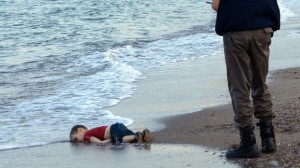A picture of a little boy’s body washed ashore has touched a nerve. It’s that of 3-year-old Aylan Kurdi, according to news reports. His 5-year old brother, Galip, drowned on the same boat, along with their mother, Rehan. The father, Abdullah Kurdi, who survived, spoke with the AP.
The family is from Syria, but had fled to Turkey. They were trying to get visas to Canada, where Abdullah’s sister lives, but Turkey wouldn’t oblige, so they set out on an ill-fated boat ride to Greece.
The image of little Aylan lying lifeless facedown in the sand has stirred much debate: Should the pictures be shown? Is Europe doing enough for refugees? While important questions, they are being asked here in the U.S. by a media that is complicit in Aylan’s death.
Like millions of others, Aylan was fleeing Syria’s “civil war,” as the media calls it. Four years in, this war continues raging in no small part because of funding from the U.S. and particularly its close allies, which have backed Sunni extremists, including ISIS and Al Qaeda, in their attempt to overthrow the Syrian government of President Bashar al Assad, who is Alawite, an off-shoot of Shia Islam.
This push to remove Assad has been led by the Sunni Gulf States, which have provided substantial support. Turkey, another close U.S. ally, has also played a major role, having allowed ISIS fighters to cross its border into Syria unimpeded for years. And Israel is in the mix too, having used its hospitals to treat wounded Syrian fighters, likely from Al Qaeda’s affiliate. “If we have to choose the lesser of evils here, the lesser evil is the Sunnis over the Shias,” explained the former Israeli ambassador to the U.S.
In addition to creating unlikely bedfellows among U.S. allies, the push to remove Assad has found bipartisan support within the U.S. Amidst this consensus, the media should be relentlessly asking: If Assad goes, then what? Will moderates take over? Even President Obama has called this “a fantasy.” While it too often goes unsaid, if Assad is removed Syria will likely fall to an empowered ISIS. Yet U.S. allies continue funding this crazy effort.
Meanwhile after four brutal years of war, Syrians are still fighting for Assad. This remarkable level of support in the most trying of circumstances calls into question U.S. media reports labeling Assad as All-Things-Evil and saying he would be quickly abandoned by his people.
And regarding Assad’s use of chemical weapons, the evidence for that may not be as rock solid as was initially reported. Meanwhile, ISIS’s increasingly well-documented use of such weapons somehow doesn’t illicit the same level of coverage or outrage.
The reporting on Syria fits a familiar pattern: A disfavored leader’s removal, we’re told, is key to unleashing a more democratic country. But where has this worked? Not in Libya, which until the U.S.-backed removal of Gaddafi was stable, but has since been overrun by competing armed militias, including ISIS; Nor in Afghanistan, where 15 years after the U.S. invasion large swaths of the country are still controlled by the Taliban; Nor in Iraq, where the U.S. invasion has left a million dead, displaced millions more (many of whom fled to Syria, destabilizing that country), and led directly to the creation of ISIS.
As the image of Aylan’s little body circles the globe, the U.S. media will tell us who’s to blame (maybe Canada). But the real culprit may be the U.S. media itself, which has laid the groundwork for so much death and destruction throughout the Middle East. Of course the fingers will be pointed elsewhere, all but ensuring there will be many more Aylans to come.

